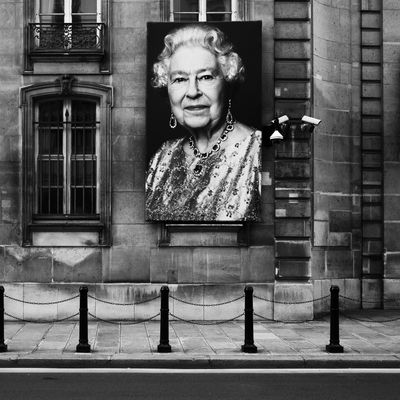
The news of Queen Elizabeth II’s death has been met with public outpourings of grief commemorating her service as the longest-reigning monarch in British history. But not everyone is in mourning. For many impacted by the lasting legacy of the British Empire — one marked by genocide, racism, and exploitation — her death has been met with indifference, rage, and even celebration. “I heard the chief monarch of a thieving raping genocidal empire is finally dying,” Uju Anya, an applied-linguistics professor at Carnegie Mellon, tweeted on Thursday. “May her pain be excruciating.”
Anya was born in Nigeria in the aftermath of its civil war, which included a genocide aided and abetted by the U.K. over oil interests. Anya is far from alone in criticizing the queen’s role in obscuring the realities of colonialism, which, over the course of her 70-year reign, she at times acknowledged but never explicitly apologized for. Yet Anya’s words were met with harsh backlash, including from Jeff Bezos, who responded, “This is someone supposedly making the world better? I don’t think so. Wow.”
Anya replied to Bezos, writing, “May everyone you and your merciless greed have harmed in this world remember you as fondly as I remember my colonizers.” Twitter responded by removing Anya’s initial tweet, claiming it violated the site’s policy, while Carnegie Mellon released a public statement saying it did not “condone the offensive and objectionable messages” Anya posted. “Free expression is core to the mission of higher education; however, the views [Anya] shared absolutely do not represent the values of the institution, nor the standards of discourse we seek to foster,” the university explained. Last year, Carnegie Mellon received a $2 million donation from Amazon for its Computer Science Academy.
“If anyone expects me to express anything but disdain for the monarch who supervised a government that sponsored the genocide that massacred and displaced half my family and the consequences of which those alive today are still trying to overcome, you can keep wishing upon a star,” Anya wrote in a tweet that remains up on her account. She spoke with the Cut about her feelings on the queen and her passing as well as the backlash she has faced for speaking frankly about colonialism.
Tell me about the feelings that inspired your initial tweet.
On Thursday, I was just reading the BBC, which had been making announcements that there were worries for the queen’s health and death was imminent. It brought on a whole lot of emotions and pain — primarily pain — about who this monarch was and what she represented, not just in the broad sense of what her throne represents, the legacy of enslavement and colonialism, but also the direct harm. People say, “Oh, she’s just a figurehead, she didn’t really do anything,” as if she’s somehow withdrawn from this. They tell me, “You’re talking about colonialism. Was that even in your lifetime?”
My experience of who she was, and the British government she supervised, is a very painful one. The harm shaped my entire life and continues to be my story and that of the people she harmed — that her government harmed, that her kingdom harmed, however you want to frame it. The genocide of the Biafra killed 3 million Igbo people, and the British government wasn’t just in political support of the people who perpetrated this massacre; they directly funded it. They gave it political cover and legitimacy.
This wasn’t just something I just read about. I was born to colonial subjects on both sides of the family — one parent from Trinidad, where the British enslaved people, and one parent from Nigeria. They met in England at university and moved back to Nigeria after independence in 1960. My parents were survivors of this genocide. My three siblings, two of them under the age of 10 at the time, were survivors. My mother was pregnant with my brother, who was born during that time; he was a war baby. This was the legacy I was born into in 1976. I spent the first ten years of my life living in Nigeria, and there was always this specter of who was lost. My earliest memories were from living in a war-torn area, and rebuilding still hasn’t finished even today. Half of my family was slaughtered with guns and bombs that this queen sent to kill us.
The response you received on Twitter suggested the ways that many exempt the queen from the British colonial legacy, especially since she’s so adored.
Queen Elizabeth was representative of the cult of white womanhood. There’s this notion that she was this little-old-lady grandma type with her little hats and her purses and little dogs and everything — as if she inhabited this place or this space in the imaginary, this public image, as someone who didn’t have a hand in the bloodshed of her Crown. How did she have that Crown? Even the crowns she wears are looted, plundered from the lands they exploited and extracted from. The entire treasury is a legacy of thievery that was achieved by murder, by enslavement, and it didn’t stop after independence.
What has the backlash over the tweets been like?
I’m trying to do okay. I haven’t been on Twitter because I’m locked out, but the hate is coming into my email inbox. People are saying, “Oh, I don’t know what you’re on about because the queen oversaw the independence of Nigeria and Trinidad.” That’s meaningless. They were still Commonwealth nations. They have independence in a figurehead way, while Britain installed puppet leaders that bowed to the queen. Even the name Nigeria is from the British. They created this fiction of a country by just arbitrarily drawing lines around territories and saying, “Okay, this belongs to the British; this is what we’re going to call it,” and joining independent nations who had nothing to do with each other, didn’t speak each other’s language. And also electing certain groups they favored to be the rulers. This is the history of the monarchy, and the queen was the head of the monarchy. Whether she was involved in day-to-day decisions or not, she existed because of those decisions. She never once opened her mouth to say sorry for the role of her government in the slaughter of 3 million civilians.
What was it like being quote-tweeted by Jeff Bezos?
Jeff Bezos incited violence against me. He rarely tweets in his own voice, but he took the time to single me out when literally half the planet rejoiced over the news. I can’t ignore the racism and misogyny — the emails I’ve been getting all start with the N-word, bitch, genetically inferior, all kinds of things. I don’t open them, but I see the subject lines. There’s also a reason I caught his attention. I recently met Chris Smalls, the young Black man who unionized at Amazon, at an event. I took a picture with him and tweeted it, praising him and saying, “Extraordinary brilliant and powerful young man who unionized Amazon.” We all know Bezos is a small and petty man.
What else do you want people to know about the monarchy’s legacy of colonization?
Colonizer is not an abstract term for me. It’s not just something I read about in history books or a word I throw around. It’s something that has directly affected my life and continues to through this day. It is deeply offensive for anyone to presume to tell me that I have to cry over the death of somebody who killed my people, or I have to be respectful in their passing. For what? Who are they to me except a violent oppressor?
In my tweet, I did not wish her death. I did not tell anyone to kill her. I said nothing except wishing her the pain in death that she caused for millions of people. There’s not going to be any apology from me. I stand by what I said. As a direct recipient of her governance and as the child of colonial subjects, I reserve the right to say what this woman’s life and monarchy and the history of the British monarchy as a whole means to me. “Speak no ill of the dead” is a weapon that’s leveled against the oppressed to silence them, to lionize oppressors, and to sanitize their history. What respect am I supposed to have for her, for her family? “Oh, well, her family is mourning her.” My family is mourning as well.
More on Queen Elizabeth II
- Introducing Queen Camilla
- The Queen Loved Her Big Singing Bass
- What Is Going On Between Prince Harry and King Charles?





